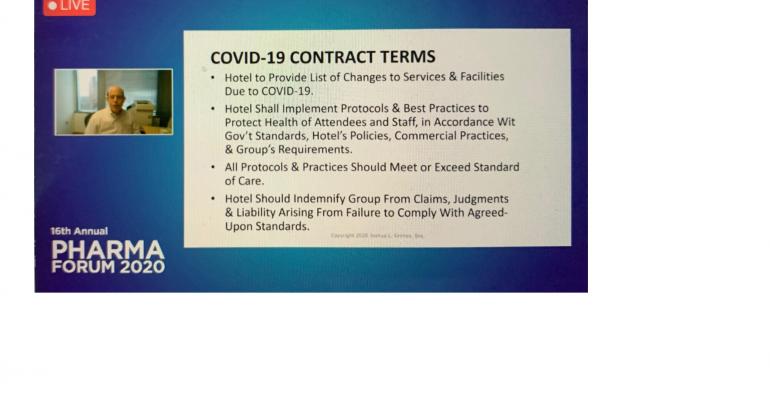One of the best-attended sessions of the 17th annual Pharma Forum conference for medical-event planners, held virtually this year from June 15-19, was “Meetings Contracts in the Post-COVID Era.” Joshua Grimes, principal attorney at Grimes Law Offices LLC in Philadelphia and a meetings-contract expert, laid out the areas where event agreements now require new wording in order to protect the host organization both legally and financially.
First, Grimes noted that with a second wave of coronavirus possible or even probable, “Flexibility in contacts is a must—they must allow for changing circumstances” as the meeting gets closer to happening. For instance, “some states and localities have different standards than the Centers for Disease Control and Prevention” for businesses to operate. Which will you follow so that you can design the physical elements of the meeting in a way that minimizes the chance of disease spread and any legal action taken if someone gets sick? “Your obligations are to meet duty-of-care standards for that locality,” so getting exclusivity to as many meeting spaces on property as possible, all for purposes of social distancing, is something planners should try to secure contractually.
One other consideration: Planners should “get hotels to indemnify the host for any failure in maintaining standards” on site that could contribute to someone getting the virus at the meeting. In other words, the cleaning protocols listed in the contract are solely the responsibility of the property to fulfill and monitor. Of course, if a resurgence of the virus happens, the wording of a contract’s force majeure clause will become critical for rescheduling the event without penalty—or canceling altogether in the case of “impracticability” or “frustration of purpose” where the meeting can no longer reach its objectives. The re-establishment of a local government’s “no-gatherings” order could bring about impracticability, while the re-establishment of a widespread corporate-travel ban could result in frustration of purpose. To address the latter, planners should place a “purpose of meeting” statement into the contract to make it easier to prove that the purpose became impossible to achieve in a more restrictive travel and/or meeting climate. And the words “pandemic” and “disease” should be included under the force-majeure possibilities in the contract.
Of course, if a resurgence of the virus happens, the wording of a contract’s force majeure clause will become critical for rescheduling the event without penalty—or canceling altogether in the case of “impracticability” or “frustration of purpose” where the meeting can no longer reach its objectives. The re-establishment of a local government’s “no-gatherings” order could bring about impracticability, while the re-establishment of a widespread corporate-travel ban could result in frustration of purpose. To address the latter, planners should place a “purpose of meeting” statement into the contract to make it easier to prove that the purpose became impossible to achieve in a more restrictive travel and/or meeting climate. And the words “pandemic” and “disease” should be included under the force-majeure possibilities in the contract.
One question that came from the session’s virtual audience: If an attendee is found to be ill during a meeting, who pays for that attendee’s 14 days of room and board during quarantine on property? Grimes said that for association events in particular, the responsibility could fall to the attendee—but regardless of whether it is an association or corporate event, the planner should come to contractual agreement with the property for discounted rates in such instances.
Lastly, for meeting contracts signed before the coronavirus pandemic, “hotels have an incentive to make amendments such as no-attrition stipulations or rescheduling options,” Grimes notes. “They don’t want to collect or fight about cancellation fees because they lose customers that way.” Despite the perception that making changes to so many important contract clauses will make for a more contentious relationship between meeting buyers and host properties, “there is a reality that the environment we negotiated in even six months ago no longer exists.”

Meetings-industry legal expert Joshua Grimes presented a contracts session at Pharma Forum 2020 for several hundred medical-meeting planners.
Post-Pandemic Event Contracts: A New Approach
Industry attorney Joshua Grimes provides perspective on clauses that must change in future meeting agreements.
0 comments
Hide comments




